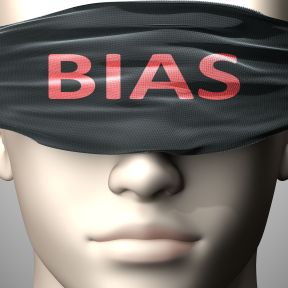BIAS- How Cultural, Cognitive, and Narrative Biases Affect Us. Naming media biases, and our own, can help us maintain a cool head.

We all have biases, we can minimize or even overcome them by being aware of them. There is a spectrum of bias from unconscious (implicit and cultural) assumptions to overt and consciously manipulative ideologies. When projected by mass media, these might land on and inflame our tendencies towards confirmation bias and cognitive rigidity, as opposed to encouraging cognitive flexibility and growth. As a psychiatrist, I favor humanitarian, inclusive, compassionate, and egalitarian ways of framing issues, as well as reason-based, thoughtful inquiries and comparisons. It’s an emotional labor to deal with stimuli that don’t favor, broaden, and build upon these preferences—and many of us are having to do a lot of emotional labor these days.

Like most Americans, I’m often frustrated by what I see in the media. Only 34 percent of Americans trust the media to report the news “fully, accurately, and fairly” according to a 2022 Gallup poll, down from about 70 percent in the early 1970s. Trust is particularly low among Republicans and Independents, but it is unclear whether that reflects their own cultural biases, the views of the media they tune into, or an actual liberal bias in the media. Youth trust social media almost as much as legacy media, per Pew.
Many of us don’t fully trust the mainstream media, and that may be in part because we feel they are biased. By naming potential media biases, we can demand that they do better and choose sources that better inform us and hopefully help us counter our own biases to amplify the building blocks of mental and social health: cognition, empathy, and relatedness. Given my preferences named above, I think the worst biases are those that work against these building blocks in favor of anti-intellectualism, self-centeredness, and division—hype, hysteria, and hate. To note, some political candidates lean into hype, hysteria, and hate as well, for all the same reasons the media does.
AfriPrime App link: FREE to download...
Examples of biases (and there is overlap between these categories):
- Editorial selection. Only certain facts and stories are chosen to support the desired narrative, while counterfactuals and alternative stories are devalued and eliminated. For example, the polarized extremes are often highlighted at the expense of the broad agreement of centrists. Studies have indicated that there is broad agreement on immigration reforms and gun regulation, for example, but this doesn’t get the attention it deserves.
- Attention economy. The media wants our eyeballs and clicks. Sober reporting on policy proposals, achievements, and failures might be seen as wonky and boring; editorial teams might strive to engage us on an emotional level.
- Media as the Fourth Estate. Rather than limiting their purview to informing the public and key decision-makers, and holding power to account, media can be seen as trying to magnify their authority.
- Visual bias. Photos and images are chosen to enhance an aspect of the story.
- Masquerading as “neutrality.” Sometimes two points of view are presented without kicking the tires, or salient issues are avoided entirely out of service to the value of “neutrality.” What might be different if the emphasis was on fairness, thoroughness, and asking hard questions to bolster the public’s reasoning capacity and attention to substance?
- Spin, slant, and outright lies – facts are spun and slanted to support a narrative; unsubstantiated claims and opinions are promoted as truth.
- Appeal to emotions rather than reason. For example, amplifying anxieties, fears, and the “survival brain” responses of readers, without balancing emotions with reason to cultivate the “wise mind.” This also can involve ad hominem attacks and flawed logic. Certain words are used to prime responses (“illegal aliens” versus “undocumented migrants.”)
- Cultural bias. A study by Perina and Wai found that the vast majority of writers and editors at the New York Times and Wall Street Journal came from elite schools with high average SAT and ACT scores. The authors proposed that this meant the individuals were “cognitively elite” and not simply “culturally elite.” It’s possible and even quite likely that culture – shared backgrounds, experiences, identities, relationships, assumptions, values, and interests – might motivate and inform these journalists rather than supposed “cognitive ability” alone. There’s also an implicit bias that a particular kind of cognition, reflected in test scores, reflects a higher capacity to think about issues.
- Institutional bias. Noam Chomsky famously theorized about the “manufacture of consent” in mainstream media, particularly consent around cultural imperatives such as war and wealth. Thus, institutional biases can bend attention and influence populations towards these cultural goals, either consciously or unconsciously, and limit discussion on countervailing arguments.
- Journalistic mind reading. Journalists might speculate on motivations, but they are not trained to make character analyses and informed predictions of future behavior; they have rarely involved experts. Is this due to a stigmatization of mental health and thus mental health expertise? Or possibly, journalists have been affected by the American Psychiatric Association’s imprimatur against professional opinions on public figures. Also, as noted above, the media may want to amplify its authority at the expense of mental health expertise.
AfriPrime App link: FREE to download...
- Questions and Answers
- Opinion
- Motivational and Inspiring Story
- Technology
- Live and Let live
- Focus
- Geopolitics
- Military-Arms/Equipment
- Beveiliging
- Economy
- Beasts of Nations
- Machine Tools-The “Mother Industry”
- Art
- Causes
- Crafts
- Dance
- Drinks
- Film/Movie
- Fitness
- Food
- Spellen
- Gardening
- Health
- Home
- Literature
- Music
- Networking
- Other
- Party
- Religion
- Shopping
- Sports
- Theater
- Health and Wellness
- News
- Culture

